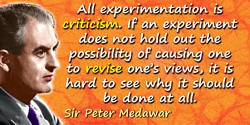 (source)
(source)
|
Sir Peter B. Medawar
(28 Feb 1915 - 2 Oct 1987)
English immunologist and author who was awarded a Nobel Prize for making skin grafts possible without tissue rejection.
|
Sir Peter B. Medawar Quotes on Truth (4 quotes)
>> Click for 53 Science Quotes by Sir Peter B. Medawar
>> Click for Sir Peter B. Medawar Quotes on | Discovery | Evidence | Hypothesis | Imagination | Mind | Process | Scientist | Theory |
>> Click for 53 Science Quotes by Sir Peter B. Medawar
>> Click for Sir Peter B. Medawar Quotes on | Discovery | Evidence | Hypothesis | Imagination | Mind | Process | Scientist | Theory |
I cannot give any scientist of any age better advice than this: the intensity of the conviction that a hypothesis is true has no bearing on whether it is true or not. The importance of the strength of our conviction is only to provide a proportionally strong incentive to find out if the hypothesis will stand up to critical examination.
— Sir Peter B. Medawar
In Advice to a Young Scientist (1979), 39.
Every discovery, every enlargement of the understanding, begins as an imaginative preconception of what the truth might be. The imaginative preconception—a “hypothesis”—arises by a process as easy or as difficult to understand as any other creative act of mind; it is a brainwave, an inspired guess, a product of a blaze of insight. It comes anyway from within and cannot be achieved by the exercise of any known calculus of discovery.
— Sir Peter B. Medawar
In Advice to a Young Scientist (1979), 84.
The scientific method is a potentiation of common sense, exercised with a specially firm determination not to persist in error if any exertion of hand or mind can deliver us from it. Like other exploratory processes, it can be resolved into a dialogue between fact and fancy, the actual and the possible; between what could be true and what is in fact the case. The purpose of scientific enquiry is not to compile an inventory of factual information, nor to build up a totalitarian world picture of Natural Laws in which every event that is not compulsory is forbidden. We should think of it rather as a logically articulated structure of justifiable beliefs about nature. It begins as a story about a Possible World—a story which we invent and criticise and modify as we go along, so that it ends by being, as nearly as we can make it, a story about real life.
— Sir Peter B. Medawar
Induction and Intuition in Scientific Thought (1969), 59.
There is nothing distinctively scientific about the hypothetico-deductive process. It is not even distinctively intellectual. It is merely a scientific context for a much more general stratagem that underlies almost all regulative processes or processes of continuous control, namely feedback, the control of performance by the consequences of the act performed. In the hypothetico-deductive scheme the inferences we draw from a hypothesis are, in a sense, its logical output. If they are true, the hypothesis need not be altered, but correction is obligatory if they are false. The continuous feedback from inference to hypothesis is implicit in Whewell’s account of scientific method; he would not have dissented from the view that scientific behaviour can be classified as appropriately under cybernetics as under logic.
— Sir Peter B. Medawar
Induction and Intuition in Scientific Thought (1969), 54-5.
See also:
- 28 Feb - short biography, births, deaths and events on date of Medawar's birth.
- Advice to a Young Scientist, by Sir Peter Brian Medawar. - book suggestion.
- Booklist for Peter Medawar.


 In science it often happens that scientists say, 'You know that's a really good argument; my position is mistaken,' and then they would actually change their minds and you never hear that old view from them again. They really do it. It doesn't happen as often as it should, because scientists are human and change is sometimes painful. But it happens every day. I cannot recall the last time something like that happened in politics or religion.
(1987) --
In science it often happens that scientists say, 'You know that's a really good argument; my position is mistaken,' and then they would actually change their minds and you never hear that old view from them again. They really do it. It doesn't happen as often as it should, because scientists are human and change is sometimes painful. But it happens every day. I cannot recall the last time something like that happened in politics or religion.
(1987) -- 


